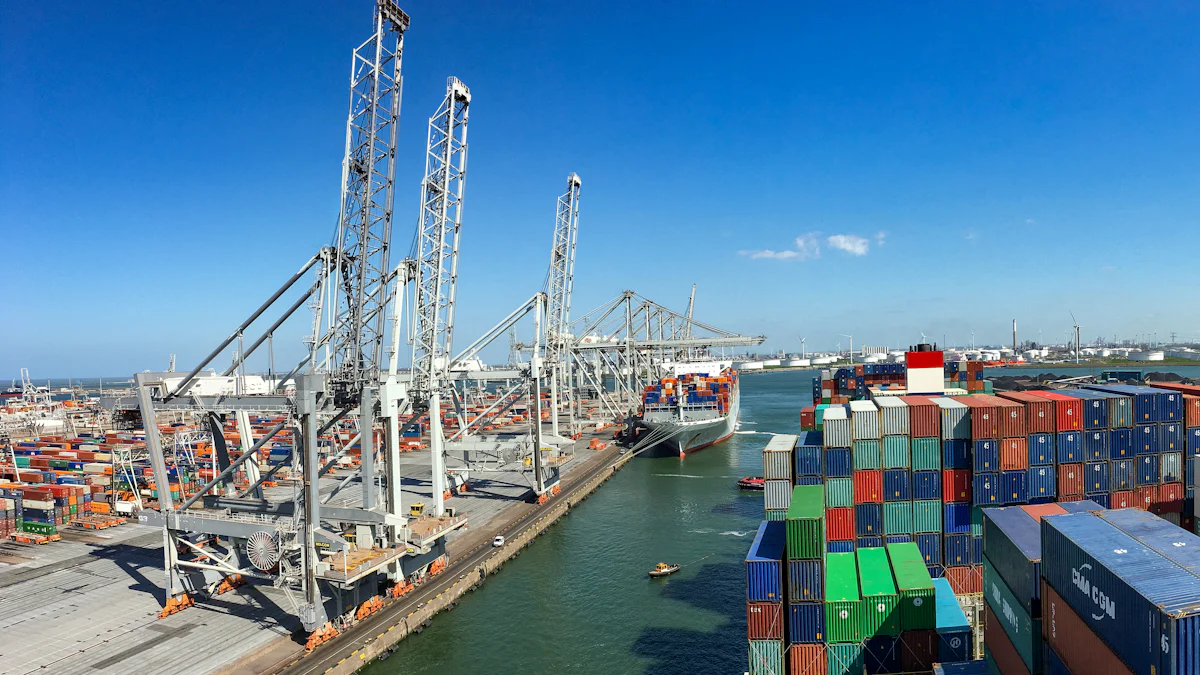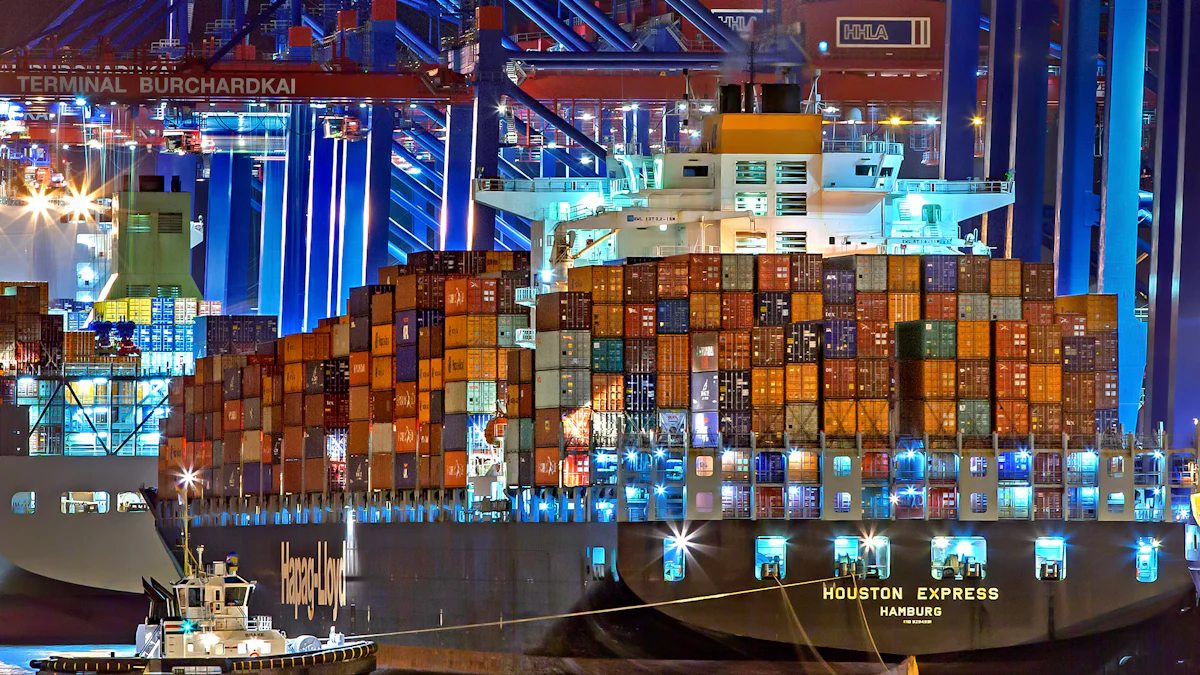Analyzing Geopolitical Influences on Global Supply Chains

Amidst Global Supply Chain complexities, businesses face challenges. The DHL Global Connectedness Report highlights these challenges. Geopolitical influences shape trade and economy. The Impact of Geopolitics on supply chains becomes evident. The Annual Global CEO Survey reveals insights. The CEO DHL Express emphasizes adaptability. The GFK Consumer Confidence index reflects market sentiments. The Consumer Confidence index figure remains crucial. Businesses must Discover strategies for resilience. The Confidence index figure remains a key indicator. Adebayo Adeleke offers expert analysis. The Cookie Policy ensures data protection.
Understanding Geopolitical Influences
Key Geopolitical Factors
Trade Policies and Tariffs
Trade policies significantly influence Global Trade and Logistics. Governments implement tariffs to protect domestic industries. These tariffs alter the competitive landscape. The Impact of Geopolitics on trade becomes evident through these measures. Geopolitical tensions between nations often lead to increased tariffs. Such actions disrupt Global Trade Disruptions and affect supply chains. The US-China conflict serves as a prime example. This conflict led to a reconstruction of supply chains. Businesses had to adapt to new trade barriers.
Political Instability and Conflicts
Political instability poses serious Geopolitical risks to Global Trade and Logistics. Conflicts in regions like Africa disrupt supply chain operations. The Red Sea crisis caused significant diversions in shipping routes. Increased shipping times resulted from these diversions. Geopolitical conflicts complicate operations and escalate costs. The Impact of Geopolitics on Global Trade becomes apparent during such events. Businesses must enhance Flexibility to mitigate these risks.
Economic Sanctions
Economic sanctions serve as a tool for exerting Geopolitical pressure. These sanctions impact Global Trade by restricting access to markets. The Impact of Geopolitics on supply chains is profound. Sanctions lead to increased costs and decreased efficiency. Geopolitical Events on Global Trade highlight the need for strategic planning. Companies must navigate these challenges to maintain competitiveness. The Director Market Intelligence plays a crucial role in assessing these risks.
Historical Context
Past Geopolitical Events Impacting Supply Chains
Historical Geopolitical events have shaped Global Trade and Logistics. The Cold War era witnessed significant shifts in trade patterns. Geopolitical tensions during this period affected supply chains. The Impact of Geopolitics on Global Trade was evident. Events like the COVID-19 pandemic exacerbated existing trends. Businesses worldwide faced drastic impacts. Geopolitical risks continue to pose threats to supply chains.
Lessons Learned from Historical Cases
Lessons from past Geopolitical events provide valuable insights. Companies learned to improve Flexibility in their operations. Geopolitical conflicts highlighted the need for adaptability. The Impact of Geopolitics on supply chains necessitates strategic foresight. Businesses must anticipate potential disruptions. Columnists like Daniel Bizo emphasize the importance of resilience. Geopolitical risks require proactive measures to safeguard supply chains.
Impact of Geopolitics on Global Supply Chains

Disruptions in Supply Chains
Delays and Increased Costs
Geopolitical tensions frequently cause delays in supply chains. These delays often result in increased costs for businesses. The Impact of Geopolitics on logistics becomes evident when shipping routes face disruptions. Geopolitical conflicts, such as those in the Middle East, lead to rerouting of shipments. This rerouting increases transit times and fuel consumption. DHL reports that geopolitical events can add significant costs to transportation. Businesses must account for these additional expenses in their budgets. The Global Supply Chain Disruptions highlight the need for strategic planning.
Supply Chain Vulnerabilities
Geopolitical risks expose vulnerabilities in supply chains. These vulnerabilities often stem from over-reliance on specific regions. The Impact of Geopolitics on supply chains underscores the importance of diversification. Companies must consider diversifying your supply chain to mitigate risks. Geopolitical tensions between major powers affect the availability of critical resources. The semiconductor industry exemplifies this issue. The US-China-Taiwan relations impact semiconductor production. This situation affects both military technology and consumer goods. Businesses must enhance resilience to withstand geopolitical shocks.
Case Studies
Case Study 1: The US-China Trade War
The US-China trade war serves as a prime example of geopolitical influence. Tensions between these two nations disrupted global supply chains. Despite these tensions, the US and China remain mutually dependent. The Impact of Geopolitics on trade becomes evident through tariff implementations. These tariffs altered the competitive landscape for many industries. Companies faced challenges in maintaining supply chain efficiency. The Data Center Cooling industry experienced shifts due to these geopolitical tensions. Businesses had to adapt to new trade barriers and regulatory changes.
Case Study 2: Brexit and Its Impact on European Trade
Brexit represents another significant geopolitical event affecting supply chains. The Impact of Geopolitics on European trade became apparent post-Brexit. Businesses faced new customs regulations and border checks. These changes led to delays in shipments and increased costs. The Data Center Staffing sector in Europe experienced shortages. Companies struggled with staffing issues due to new immigration policies. The Data Center Owners had to navigate these challenges to maintain operations. The Data Center Predictions indicate ongoing adjustments in the industry. Businesses must continue to adapt to the evolving geopolitical landscape.
Strategies for Mitigation
Diversification of Supply Sources
Benefits of Diversification
Diversification of supply sources offers significant advantages. Businesses can reduce risks associated with geopolitical tensions. The Institute emphasizes the importance of having multiple suppliers. Companies can avoid disruptions by not relying on a single region. Bozhilov, a renowned expert, highlights how diversification leads to more stable operations. The Institute Supply Chain Survey reveals that diversified supply chains are more resilient. This strategy also allows companies to tap into competitive pricing. Businesses can leverage different markets for cost-effective sourcing.
Challenges in Implementation
Implementing diversification poses several challenges. Companies face logistical complexities when managing multiple suppliers. The Institute notes that coordination becomes a significant issue. Businesses must navigate different regulatory environments. Bozhilov points out that cultural differences can also be a hurdle. The Research Director at the Institute stresses the need for robust communication systems. Companies may encounter increased costs during the transition phase. The Problem of aligning quality standards across suppliers remains critical. Businesses must invest in technology to streamline these processes.
Building Resilient Supply Chains
Technological Innovations
Technological innovations play a crucial role in building resilience. Advanced analytics help predict potential disruptions. The Institute advocates for the use of AI in supply chain management. Companies can optimize routes and reduce delays through technology. Bozhilov emphasizes the importance of real-time data monitoring. Businesses can quickly adapt to changing geopolitical landscapes. The Research Director highlights blockchain as a tool for transparency. Companies can ensure traceability and accountability in their operations.
Strategic Partnerships
Strategic partnerships enhance supply chain resilience. Collaborations with local suppliers mitigate geopolitical risks. The Institute suggests forming alliances with logistics providers. Businesses can share resources and expertise through partnerships. Bozhilov underscores the value of joint ventures in volatile regions. Companies can achieve economies of scale by pooling resources. The Research Director advises on establishing long-term relationships. Businesses can gain a competitive edge through strategic alliances.
Policy Recommendations
Government Role in Mitigation
Governments play a pivotal role in mitigating supply chain risks. Policymakers must create favorable trade agreements. The Institute calls for reducing tariffs to facilitate smoother trade. Governments should invest in infrastructure to support logistics. Bozhilov advocates for policies that encourage innovation. Regulatory frameworks must adapt to the changing global landscape. The Research Director stresses the importance of international cooperation. Governments must work together to address global challenges.
Industry Best Practices
Industry best practices are essential for managing supply chain risks. Companies should adopt flexible strategies to handle disruptions. The Institute recommends continuous risk assessment. Businesses must prioritize sustainability in their operations. Bozhilov highlights the shift towards greener logistics. Companies should focus on ethical sourcing and production. The Research Director advises on implementing robust privacy policies. Businesses can build trust by ensuring data protection.
Addressing Geopolitical influences remains crucial for maintaining Supply Chain Efficiency. Businesses must integrate Geopolitical analysis into their planning to navigate the unpredictable landscape. Freight Forwarders play a vital role in Tackling Logistics Challenges by leveraging data from various sources. This proactive approach allows Forwarders to strategize effectively and mitigate risks efficiently. The Red Sea crisis exemplifies the need for preparedness in Global trade. Companies must invest in risk management processes. Freight Forwarders should balance resilience with efficiency. Policymakers must collaborate with Freight Forwarders to ensure robust Semiconductor supply chains. Freight Forwarders must remain vigilant in April to adapt to evolving Geopolitical trends.
See Also
The Significance of Global Trade Supply Chains
Addressing Globalized World Supply Chain Growth Hurdles
Exploring Global Consumer Needs Through Jusda Supply Chains
Maximizing Cost Efficiency in Supply Chain Economics
Transforming Logistics Through Innovative Supply Chain Practices
